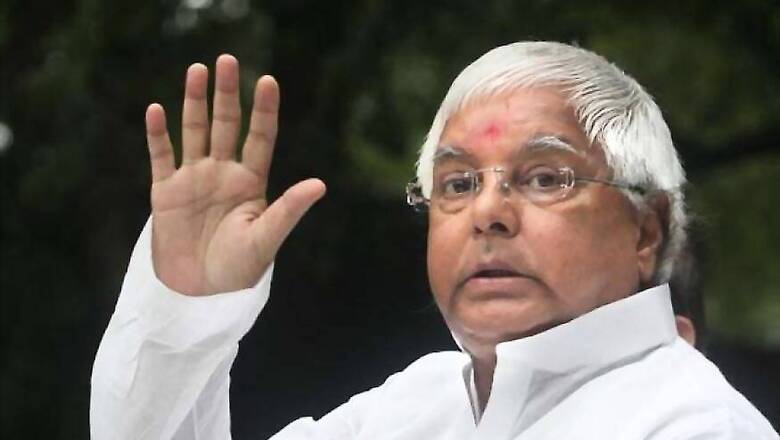
views
Patna: The mighty Bihar leader Lalu Prasad Yadav seems to have been politically cornered this time as his party has drawn a blank for the first time since its inception in 1997. After a complete rout of the Rashtriya Janata Dal (RJD) in the just-concluded Lok Sabha elections, the issue being hotly debated in political circles is whether the poll results are the beginning of the end of Lalu era in Bihar.
Such speculations since the declaration of poll results may turn out to be myopic and the prophets of doom may prove wrong, but it is certain that Lalu’s survival in politics will largely depend upon whether he is out on bail on health grounds or compelled to complete his jail term in the fodder scam cases in which he has been convicted.
The past experiences indicate that even if he is out on bail, he will be barred from indulging in political activities for the state assembly elections due in 2020. There is little chance of Lalu wriggling out of this legal mesh, as five more cases are pending against him in the CBI courts of Ranchi and Patna and are in different stages of trial.
In his absence, his younger son Tejashwi Prasad Yadav was given the command to steer the party. But Tejashwi could not enter into his father’s shoes, leading to RJD’s debacle in the parliamentary polls. His elder son Tej Pratap Yadav and daughter Misa Bharti made all efforts to scuttle Tejashwi’s bid to maintain party’s electoral fortune.
Despite his machinations from behind the bars, Lalu’s acumen in election management and his poll-winning social engineering, for which he is known, have gone haywire this time as the RJD lost from all 19 Lok Sabha constituencies it contested as the main protagonist of the grand alliance comprising six political parties.
The zero result in 2019 is his worst ever performance as even during his most awful times Lalu had won four seats each in 2009 and 2014 Lok Sabha elections. It is an indication that the days of Lalu’s brand of politics veering around ‘social justice’ are over and the new players pursuing ‘inclusive politics’ would now be in the saddle in Bihar.
Riding the anti-Congress wave, the Janata Dal had won 32 Lok Sabha seats out of 54 in the united Bihar (before creation of Jharkhand) in the 1989 elections. Back then, Lalu was one among the many stalwarts who spearheaded the campaign against the Congress after the infamous Bhagalpur riots.
Lalu had emerged as the front-ranking leader of the socialist-strain of politics under the tutelage of Chaudhary Charan Singh, Devi Lal, Karpoori Thakur and Sharad Yadav. After Karpoori Thakur's death, he became the leader of opposition in Bihar legislative assembly.
His next phase of political career began after the 1990 assembly elections when he was elected as the chief minister despite opposition from the old socialist leaders. The socialists wanted Ram Sundar Das to be the chief minister but his machinations, with support from Nitish Kumar, eventually clinched the deal in his favour.
Lalu consolidated his position further as messiah of backward classes and Dalits after implementation of the Mandal Commission report and later pursued the Muslim-Yadav (M-Y) formula, leading to a rock-solid unity of the backward castes, Dalits and Muslims.
It was purely because of Lalu’s leadership capabilities and his social engineering that the Janata Dal won 31 out of 54 Lok Sabha seats in 1991 and 22 seats in 1996 parliamentary polls.
But he charted an independent course in politics when the national leaders of the larger Janata Parivar did not allow him political space and tried to pin him down after his alleged involvement in the fodder scam cases.
He broke away from the Janata Dal on July 25, 1997 to float his own outfit-- Rashtriya Janata Dal -- with the support of 17 Lok Sabha MPs and eight Rajya Sabha MPs from Bihar. The entire Janata Dal legislature party in Bihar became part of the RJD under his leadership.
Subsequently, Lalu pulled out a rabbit from his hat when he appointed Rabri, a homebody at that time, as chief minister before surrendering in a CBI designated court and going to jail.
Lalu also expanded his social horizon by roping in the support of some upper castes, especially the powerful Rajputs, to win successive elections. In 1998 Lok Sabha polls, RJD retained the tally of 17 Lok Sabha seats in Bihar but performed poorly in 1999, winning only seven seats.
However, Lalu emerged victorious in the 2000 state assembly elections with the support of Congress and formed the government in Bihar with Rabri Devi as the chief minister. It was during this period that Jharkhand was sliced from Bihar and the number of assembly seats was reduced to 243 from 325 and Lok Sabha seats to 40 from 54.
In the 2004 Lok Sabha polls, Lalu bounced back with 22 Lok Sabha seats out of 40 and became part of the then UPA government at the Centre in which he was the railway minister.
The RJD's electoral fortunes started waning from February 2005 assembly polls, in which the party could win only 75 assembly seats. In the subsequent October-November 2005 assembly polls, the RJD could win only 54 seats. Lalu's graph fell further down and the RJD could win only 22 seats in 2010 state polls.
The party's performance remained poor in Lok Sabha polls with only four seats in 2009. After his conviction in a fodder scam case in 2013 and sentence of five years, he was disqualified from the Lok Sabha and barred from contesting elections. In 2014 Lok Sabha polls, his party could manage to win four seats even in the Narendra Modi wave.
After successive poll debacles, Lalu stitched an alliance with Nitish Kumar's JD(U) and Congress and led to grand victory in the 2015 Bihar assembly elections by articulately playing the Backward-Muslim-Dalit card. The RJD emerged as the single largest party with 80 assembly seats and JD(U) and Congress won 71 and 27 seats, respectively.
Now in jail, Lalu’s biggest challenge will be to fill the leadership vacuum in the party and rethink keeping the mantle of power within his own family. It has now been proved that there is no one in the family, neither his wife Rabri Devi nor his son Tejashwi Yadav, who can cast spell on the electorate the way Lalu did during election campaigns.
“The RJD is private limited company of Lalu’s family but the Yadavas are not his captive vote bank any more. The new generation is looking forward to new avenues and does not want the quota politics to decide its electoral choice now. The backward politics, too, has moved a step ahead and no political party or leader can claim to be its sole leader or champion in today’s politics,” said Ranjan Prasad Yadav, who had defeated Lalu Yadav from Patliputra seat.
Lalu’s absence from the mainstream could expose the RJD to the risk of desertions, especially by its MLAs ahead of the state assembly polls. The BJP has already started efforts at chipping away the Yadav vote by using quite a few Yadav leaders, including state minister Nand Kishore Yadav and party president Nityanand Rai.
The Yadavs are evenly distributed in almost all the 40 Lok Sabha constituencies and are numerically preponderant among the four backward castes in Bihar.
(The author is a senior journalist. Views expressed are personal.)




















Comments
0 comment